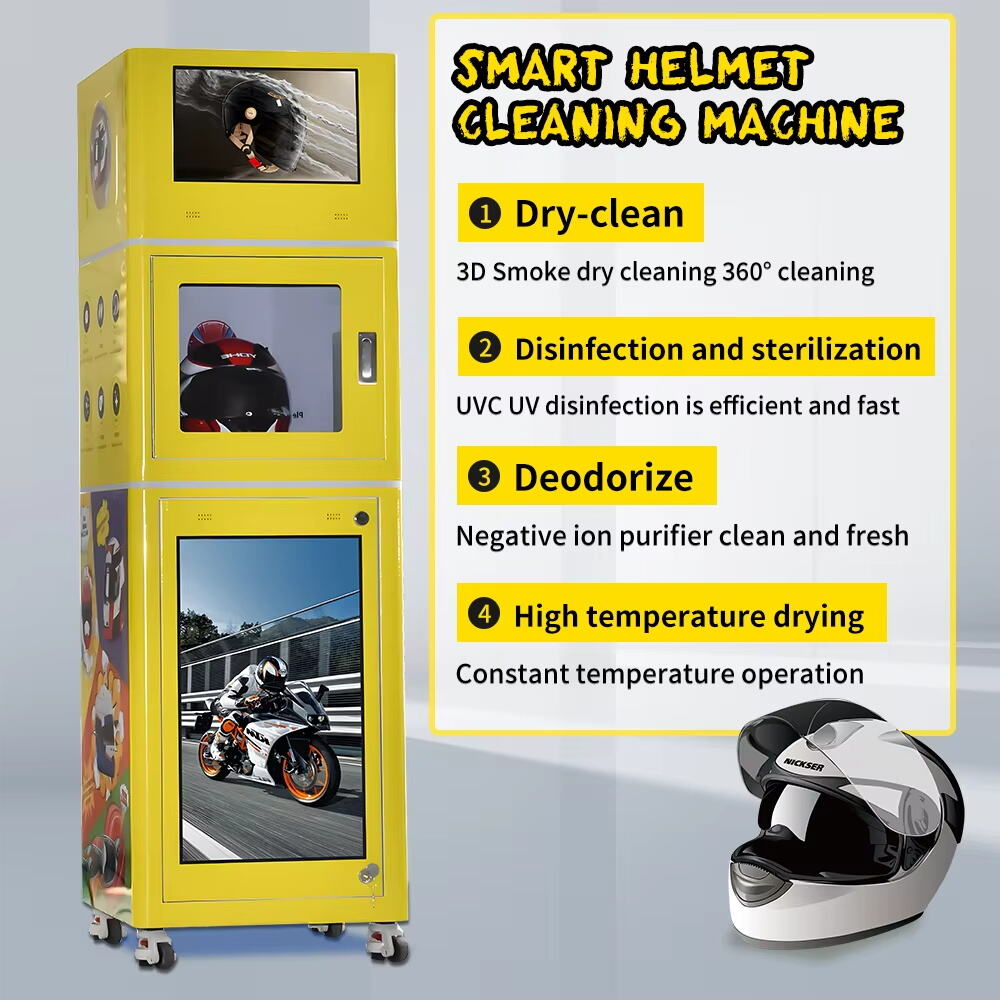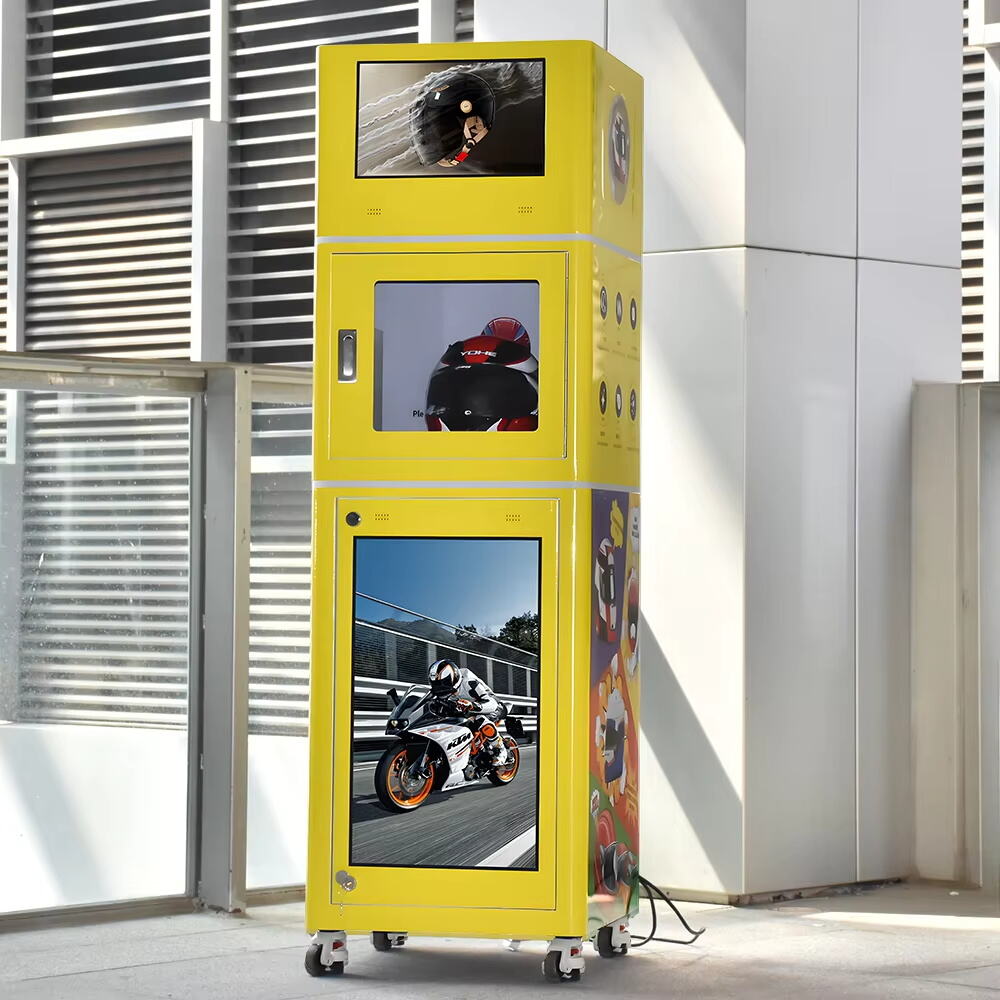Преобразуване на хигиената на каските в обществени и комерсиални помещения
С нарастващото търсене на споделен транспорт и увеличаването на осъзнатостта относно личната хигиена, чистотата на каските е станала основен фокус в обществени и комерсиални сектори. Комерсиални Машина за чистване на шапки решенията предлагат бърз и ефективен начин за дезинфекциия и съхранение на мотористки каски, осигурявайки по-безопасен и комфортен потребителски опит. Тези напреднали машини не само повишават стандартите за хигиена, но също така помагат услуга на доставчиците да поддържат репутация.
Технология за бързо почистване и съхранение
Високо-ефективна стерилизация
Търговски Машина за чистване на шапки технологията включва модерни методи за стерилизация, като озон или UV-C светлина, за елиминиране на бактерии, вируси и неприятни миризми. Тези процеси на стерилизация са ненавлазивни и безопасни за честна употреба, осигурявайки напълно дезинфекцирани каски без нанасяне на вреда. Потребителите могат бързо да използват отново чиста и безвъздушна каска за минути.
Напреднали системи за съхранение
Фазата на сушене в машина за почистване на каски е толкова важна, колкото и самото почистване. Сушене с високоскоростен въздух с контрол на температурата ускорява процеса на сушене и предотвратява натрупването на влага, което може да доведе до растеж на плесен или бактерии. В среди с висок оборот на каски, като хъбове за споделено пътуване или пунктове за наемане на мотори, системата за бързо сушене значително повишава оперативната ефективност.

Подобряване на клиентското изживяване
Лесна за Използване Операция
Съвременните дизайни на машини за почистване на каски се фокусират върху взаимодействието с потребителя. Сензорните интерфейси, ясните инструкции и автоматизираните цикли правят машините достъпни за широк кръг потребители. Независимо дали са разположени в търговски центрове, паркинги или... услуга центрове, лесната употреба допринася за по-голямо удовлетворение на клиентите и по-често повторно използване.
Видими стандарти за хигиена
Предоставянето на видима и функционална машина за почистване на каски показва ангажимента на бизнеса към здраве и чистота. Клиентите по-скоро ще имат доверие и ще се връщат в обекти, които активно инвестира в хигиенна инфраструктура. Тази видимост подобрява лоялността към марката и може да бъде конкурентно предимство в услуга -ориентирани индустрии.
Поддържане на бизнес операциите
Мащабируемо разгръщане
Машините за почистване на каски се предлагат в различни размери и вместимост, което позволява на бизнесите да мащабират според нуждите. За по-малки магазини или бензиностанции, компактни модели предлагат решение, икономисващо пространство. За транспортни възли или големи сервизи, индустриални модели могат да почистват дузини каски на час.
Рентабилна поддръжка
Въпреки напредналите си функции, машините за почистване на каски са проектирани с цел лесна поддръжка. Модулни компоненти, самоочистителни филтри и системи за наблюдение на състоянието намаляват честотата и разходите за ремонт. Тези функции гарантират дългосрочна надеждност, което води до по-ниски оперативни разходи и максимално възстановяване на инвестициите.
Промоция на общественото здраве и безопасност
Смякане на рисковете от кръстосана контаминация
Споделените каски често носят риска от предаване на бактерии, гъбички и кожни заболявания. Машина за почистване на каска помага за елиминиране на тези рискове, като осигури, че всяка каска е дезинфекцирана преди употреба. Това допринася за по-безопасна обществена среда, особено в сектори като туризма и услугите за доставки.
Насърчаване на най-добрите практики за хигиена
Чрез превръщането на почистването на каските в лесен и видим етап от процеса, бизнесите могат да информират клиентите си относно хигиената и да насърчават отговорно поведение. Интегрирането на машини за почистване на каски в ежедневните рутини подпомага осведомеността и допринася за усилията за здравеопазване в мащаб на цялата общност.
Интеграция с интелигентни технологии
ИоТ и дистанционно наблюдение
Някои машини за почистване на каски са оборудвани с възможности за IoT свързване, което позволява на операторите да следят отдалечено използването, графиката за поддръжка и диагностични съобщения за грешки. Тази функция е особено полезна за операции на няколко места или за управляващи компании от трета страна, които се стремят да оптимизират предоставянето на услуги.
Плащания и контрол на достъпа
За още по-голямо удобство, много от машините за почистване на каски вече поддържат безконтактни методи за плащане и достъп чрез мобилни приложения или RFID карти. Тази функция позволява на компаниите да извличат печалба от услугите за почистване на каски или да ги включват като част от програма за лоялност или абонаментен модел.
Екологични съображения
Енергийна ефективност
С нарастването на строгите еко регулации, индустрията на машини за почистване на каски преминава към енергийно-ефективни решения. Машините са проектирани да използват по-малко електроенергия, като при това осигуряват висока производителност, което допринася за по-нисък въглероден отпечатък.
Еко-съобразни почистващи препарати
Някои системи за почистване на каски използват биоразградими почистващи агенти и материали, които могат да се рециклират, което ги прави по-устойчиви. Това не само намалява въздействието върху околната среда, но и привлича клиенти, загрижени за екологията.
Приложение в разнообразни среди
Услуги за наем и споделяне на мотори
За предприятия, предлагащи наемане на мотори или споделени пътувания, машините за почистване на каски са основни инструменти за осигуряване на безопасност и чистота. Те помагат за поддържане на доверието на клиентите и за спазване на здравните норми.
Фитнес съоръжения и спортни обекти
В места, където каските се споделят за дейности като велосипедизъм или контактни спортове, машините за почистване на каски осигуряват надежден начин за дезинфекциия на оборудването между потребителите. Това приложение подобрява хигиената в развлекателните съоръжения и подпомага запазването на членовете.
Бъдеще на решенията за хигиена на каски
Иновации в дизайна
Продължаващите иновации в дизайна на машините за почистване на каски целят да направят машините по-компактни, стилни и ефективни. Компаниите се фокусират върху интуитивни потребителски интерфейси и автоматизирани функции, за да се минимизира ръчното участие.
По-широко прилагане в различни индустрии
С нарастващото съзнание Helmet Cleaning Machines се използват все по-често в различни индустрии, включително в доставчици на услуги, паркове с атракциони и центрове за обучение. Многостранността и предимствата на тези машини ги правят стандартен компонент в инфраструктурата за обществена хигиена.
ЧЗВ
Колко често трябва да се почиства каска с машина за почистване на каски?
Каските, използвани в общ споделен ресурс, трябва да се почистват след всяка употреба. За лични каски се препоръчва почистване веднъж седмично или след интензивна употреба.
Безопасни ли са машините за почистване на каски за всички типове каски?
Повечето машини за почистване на каски са проектирани така, че да съответстват на широк спектър от размери и материали на каските. Въпреки това се препоръчва да се проверят спецификациите за съвместимост, предоставени от производителя.
Какво е средното време за почистване на шлем?
В зависимост от модела, цикълът за почистване и съшитаване обикновено отнема между 3 и 8 минути.
Може ли тези машини да се използват на открито?
Много от машините за почистване на шлемове са водонепропускливи и произведени от издръжлив материал, което ги прави подходящи както за вътрешна, така и за външна употреба.
Съдържание
- Преобразуване на хигиената на каските в обществени и комерсиални помещения
- Технология за бързо почистване и съхранение
- Подобряване на клиентското изживяване
- Поддържане на бизнес операциите
- Промоция на общественото здраве и безопасност
- Интеграция с интелигентни технологии
- Екологични съображения
- Приложение в разнообразни среди
- Бъдеще на решенията за хигиена на каски
- ЧЗВ
